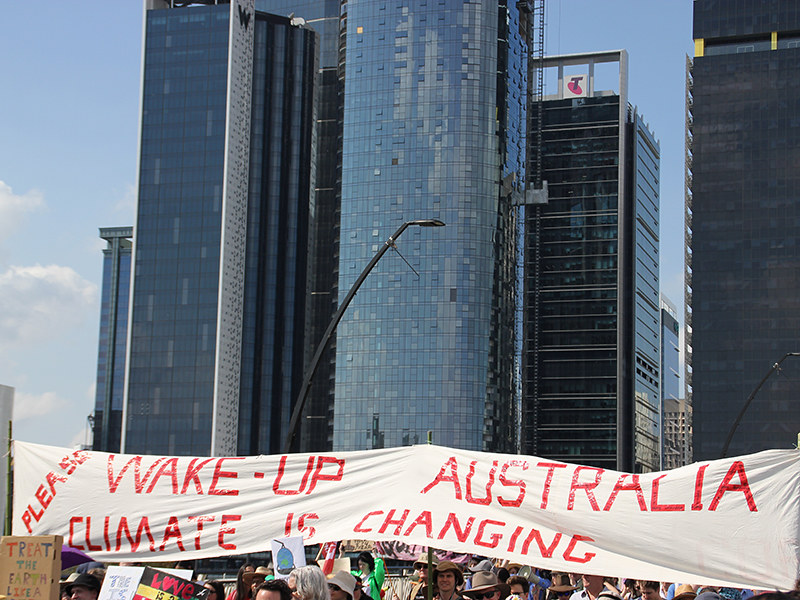
Crowds protest climate inaction at the School Strike 4 Climate Brisbane in 2019. Photo credit: powerofgreatbarrierreef on Visualhunt.com.
As temperatures climb, rivers rise and fires burn, the need for informed and effective coverage of climate change is clear.
But who should provide that coverage? Journalists specialising in it are few and far between, particularly in the Global South.
In the absence of journalistic coverage, Non Government Organisations (NGOs) have produced news releases and other content for their in-house media centres. These organisations are openly agenda-driven, leaving readers to question if their accounts are accurate and unbiased.
Further, unlike most journalistic news outlets, NGOs often publish pieces without bylines. Such work can be difficult to trust – who writes them, and why aren’t the writers credited? These uncertainties give readers reason to doubt what is reported.
Doubt compounds inaction, which is an unacceptable outcome for an urgent topic like climate change.
But even clear attribution and commitment to fact-based reporting isn’t enough. Journalistic coverage has actively harmed the public perception of climate change’s seriousness and discouraged readers from taking action.
What went wrong?
Ironically, one of the values that journalists use to earn trust – balance – has caused result in the work becoming less trustworthy.
One study found that in a sample of articles from the United States’ “prestige press” between 1988 and 2002, not even 6% of articles stated that human activity alone was responsible for climate change.
Worse, nearly the same proportion of articles said that human activity was not responsible for climate change.
More than half the articles equivocated, stating that some sources believed human activity to be responsible and some did not. Another piece said that journalists’ sources on climate change issues are not only scientists and other subject experts, but also encompass “a broader range of stakeholders” that gives page space to public relations professionals and other non-experts.
The situation is no better in the Global South. A study from the Australian Centre for Independent Journalism found nearly one-third of the articles it examined “did not accept the scientific consensus that human beings are major contributors to global warming”.
What could go right?
So far, journalistic values have not been helpful in climate change reporting.
But it doesn’t have to be that way. For example, instead of perpetuating the illusion of a “he said, she said” debate about anthropogenic climate change, journalists could honour their commitment to balance (and accuracy) by quoting multiple experts who suggest different actions for readers to take.
These differences do not need to be balanced in the sense of “put at odds,” which may bewilder readers into inaction – rather, they can be balanced in the sense of “complementary,” giving readers multiple paths to meaningful engagement.
Two additional journalistic values, accuracy and fairness, may also also support climate change reporters. A University of Kansas study found a neutral tone is more likely than an angry one to convince readers of an issue’s seriousness, so much so that “the more coverage used anger as a way to discuss the issue, the less people felt it was important”.
Also, journalistic norms around attribution (that it should be done) and transparency (that conflicts, payments and potential threats to independence should be disclosed) make journalists’ work less susceptible to the scepticism mentioned earlier around byline-free, agenda-driven NGO content.
Another thing that may alleviate readers’ reservations is journalism’s code of ethics. Codes vary between regions, but in democratic societies, practitioners pledge to observe a number of guidelines that hold their work to higher standards than that of non-journalists.
Adherence to professional codes of ethics is imperfect because those who adhere to them are imperfect, but it is arguably better to have named writers striving to meet the codes’ requirements – and sometimes facing career-ending consequences should they fall short – than to have unknown writers bound to no such codes and at risk of no such consequences.
Still room for advocacy
Values, ethics and all, journalists are not merely uninterested reporters conveying facts from one end of civil society to another.
University of Tasmania professor Libby Lester writes that environmental journalists in Australia perceive their role as one of advocacy, and University of Toronto associate professor Dr Sheldon Ungar writes that for any journalist reporting on scientific subject matter, active engagement is crucial to success.
“Science is an encoded form of knowledge that requires translation in order to be understood,” Dr Ungar said.
And journalists are taking on this translation work. Among others, Guardian Australia has an Environment team, as does the ABC, while Singapore-based Channel News Asia has a designated climate change section, audio content and far-reaching audiovisual reporting: “CNA TV is now viewed in 29 territories across Asia with its satellite footprint stretching across Asia, the Middle East and Australia.”








Important opinion piece Jude with a lot to think about. I wonder what time poor journalists think about this issue.
Thank you, Alex, for your kind words and your help with posting. That’s an excellent question – I’ll ask it on the Twitters (and in person where possible) and see if anyone chimes in.
If we want the public to take action on climate change, we need to consider how we’ll deal with the biased commentaries about this issue from shock jocks and TV personalities who dismiss the empirical data supporting it.
Consumers of climate change news are usually environmentally-aware and are doing whatever they can to learn about reducing carbon emissions.
The questions is: how do we reach beyond this niche audience? The answer is complicated and unclear, but perhaps part of it is harnessing popular communication technologies like TV, the internet, and social media to deliver advocacy journalism on climate change.
Joseph Misuraca, Pascoe Vale
Hi Joseph, reaching neutral or sceptical audiences is absolutely complicated. Audiovisual media can be an important part of the approach. I do wonder to what extent quality of coverage can ever make up ground lost to weak science education and tired, overworked people trying to keep the proverbial wheels on the cart.
Hi Jude,
Thanks for your piece. What about a third option of training specialist journalists in this area? It used to be, many moons ago, that journalists could specialize in a particular area, ie. education journalists would know everything there was to know about that topic, similar to the reporter who spent their entire careers working the police/crime beat, or journalists dedicated to entertainment etc. These journos would make every effort to keep themselves up-to-date on the latest developments, and because of that in-depth knowledge, they then were able to provide detailed reports and investigations–see George Monbiot in the UK (for climate).
But I wonder, if in our quest to go broader in skill acquirement, ie. everyone needs to know how to be a multimedia journo, doing social media, video, audio, writing etc., have we lost the point and actually we should be training journalists to be subject experts more, and teach the skills later? I might be biased as my training was in the late 90s/early 2000s… but it does seem some of our problems in journalism could be solved if we didn’t loose so much of the fundamentals.
P.S. like the questions to leave a post, tho felt too much like a quiz (I skim read), so almost didn’t make it to the comment section–tho guessing that’s the point??
Hi Ann, I really like the idea of specialist journalists (and would certainly rather be one than a generalist). It would seem challenging for any organisation with revenue difficulties to support specialisation, but maybe there’s a way.
And glad you liked the quiz – I did indeed want to make sure commenters did a decently thorough read before commenting.
I like what you said about balanced complementary reporting. I hadn’t thought about that before but I realised it’s what I’ve been reading for years. It’ll be a good too to keep in mind in my own writing for sure.
Hi James, thank you. I love those “aha” moments.
Perhaps the answer is like sponsored news articles. Ones that need to be labeled as advertising or sponsored. NGOs will always present their work in the agenda of the NGO, its inevitable, and I’d advocate for neutral journalism as solution but the ABC has a lot of people who hate it or distrust it as leftist propaganda.
So, maybe, clearer labelling and legal requirements to make people understand that this is news presented by in house researchers can help with making it look less like it is trying to sneak an agenda through rather than is presenting findings?
That’s a good idea. Maybe a byline explaining where they get their funding has to appear before each article, so the uninformed reader can be slightly informed beforehand.
Hi Matt, that’s an interesting idea. Helping readers spot agendas certainly sounds appealing, though I worry that the execution might result in the kind of confusion that leads to apathy/withdrawal. Then again, as Jason on “The Good Place” says of throwing Molotov cocktails, at least doing it would give you *different* problems.
Hi Jude,
What a wonderful and insightful piece, love it!
I found it interesting how you touched on addressing the issue of climate change in a “neutral tone” when you discuss what could go right.
We are in a climate change emergency. This is the reason journalists are addressing this issue in an assertive manner is because they are feeling this sense of urgency. The majority of Australians have a level of understanding about climate change. Stats show 87% of Australians surveyed accept that climate change is real and happening and driven to some extent by human behaviour.
Maybe journalists need to think about WHO we are targeting and how we can get this message across to effectively educate or just simply create some element of responsibility.
As you mentioned, aggressive messages with climate change scare tactics are not necessarily the answer.
A small but noisy minority actively deny that climate change is an issue. The rest of “climate change deniers” simple choose to avoid, minimise and switch off but don’t necessarily deny it.
How can we, as information disseminators (journalists) think of innovative ways to project these issues to increase engagement?
I feel like the biggest flaw in our approach is science communication. It ignores the fact that we are dealing with humans. Presenting facts about global warming so far has not sufficiently convinced the general public, or policy makers. Selling science is a mightily difficult task and the facts and figures become all too familiar, with responses like “we’ve heard this before”.
Perhaps, the main challenge now for journalists is not presenting facts and figures but inspiring and motivating people. Showing the public what possible solutions to climate change are already in play or within reach??
As well as this, educating those concerned about climate change on how to talk about climate change, rather than preaching to the converted.
Maybe this involves not just a environmental team in a newsroom, but a social/cultural team?
As you mention, the seriousness of climate change reporting is welcome, with the implementation of specific ABC and Guardian environmental teams. I can add that I heard on the please explain podcast that The Sydney Morning Herald / The Age have also made editorial decisions to not publish anything that gives prominence to climate change denial.
It’s a shame that some climate advocacy reporting is not only addressing the issue by outlining what should be done, but it’s even also trying to convince some of its existence.
Here is a devoted segment dedicated to climate denial on Sky News: https://www.youtube.com/watch?v=lmJd3HfT8mc. Beyond Belief. Surely some media regulators could step in and restrict the broadcast of things like this?